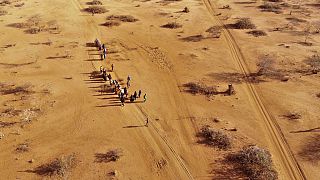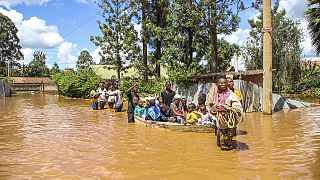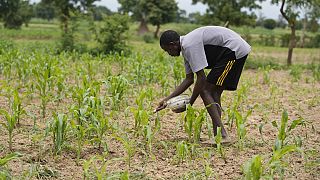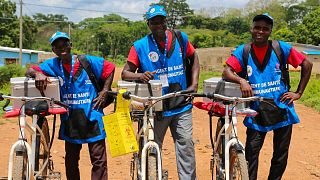Kenya
Lucy Toho is one of many women here in Meru County, Kenya, who are on their daily journey to back breaking work. Toho is from Ntulli village where a river used to water farms where she and her neighbours worked.
Now, after successive periods of drought in the Horn of Africa, the river has dried up and Toho, like other women here, is seeking other ways to feed and clothe her family.Toho breaks rocks at a quarry to create ballast for the building industry.
It's not an easy task, Toho is 65 years of age and she has nine children. She says it's all she can find to ensure her children are fed and remain in school.
"My children were sent away from school because of lack of school fees. At the time, I was jobless because farming became unproductive due to failed rainfall. My husband is unable to work because of his old age. When I started crushing ballast, I managed to sell a load of ballast enough to fill a lorry. I sold it in a 10kg containers at $0.19 (each). I paid little amount of school fees and asked the teacher to give me more time to raise for the balance. I continued with crushing ballast and I was able to clear fees arrears for that term. Sometimes we lack food but I am forced to do this work because we have no option," says Toho.
Toho’s situation is not unique in this region. The women here receive just $3.8 (US) dollars for twenty containers which hold ten kilos. The women here do not have a ready market for the ballast, and it can take up to two to three months before they make any sales.
The forecast isn't optimistic.
In a report released last month (February 22 2023) the World Meteorological Organization warned: " Catastrophic consequences of the multi-year drought will continue in 2023 in the Horn of Africa, leaving communities in urgent need of assistance.
According to the World Food Programme there are already 22 million people in the Horn of Africa who are acutely food insecure because of three consecutive years of low or no rainfall.
The WFP says 5.1 million children in Somalia, Ethiopia and Kenya are acutely malnourished.
In Kenya alone, nearly one million children under five years, as well as pregnant or breastfeeding women are acutely malnourished.
Jane Mutune, a researcher on environmental governance at the University of Nairobi says women in rural areas are usually the breadwinners of their families.
These women source their livelihood from nature, and when nature is affected by climate change, their source of income is adversely affected.
"The women in the rural areas, they are disproportionately affected by climate change because of the social roles they do, they are the ones who gather firewood for the families, they fetch water, they also look after the children and importantly they are the ones that have to put food on the table," says Matune.
According to Matune the most important move going forward is to ensure countries around the world stick to the Paris Agreement adopted during the UN Climate Change Conference (COP21) in 2015.
"So the question is, to what extent are these policies put in practice that our women can be able to benefit in a more economical way and also their socio-economic status is improved," says Matune.











Go to video
Climate change is bringing malaria to new areas
01:49
Togo: Women candidates campaign ahead legislative and regional elections
01:38
Excess heat and climate change pose health hazards for global workers
01:56
Ivory Coast: Women cooperative for vegetables transforming rural village
02:05
Zimbabwe: El Nino-linked drought threatens maize production
02:18
No respite from deadly heat in Mali and elsewhere in the Sahel